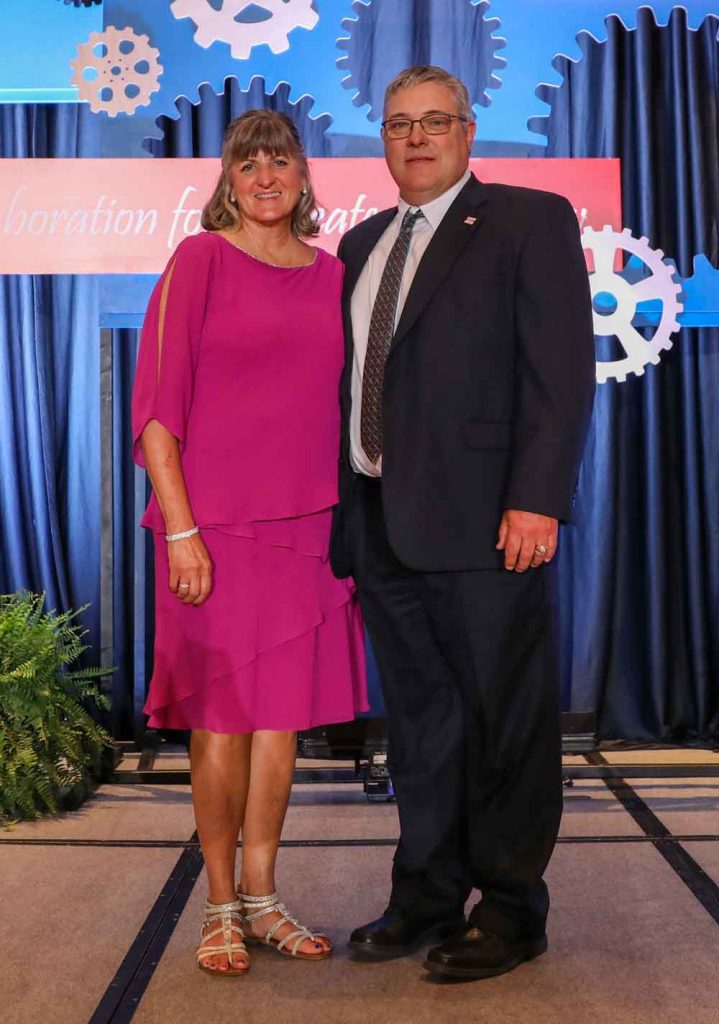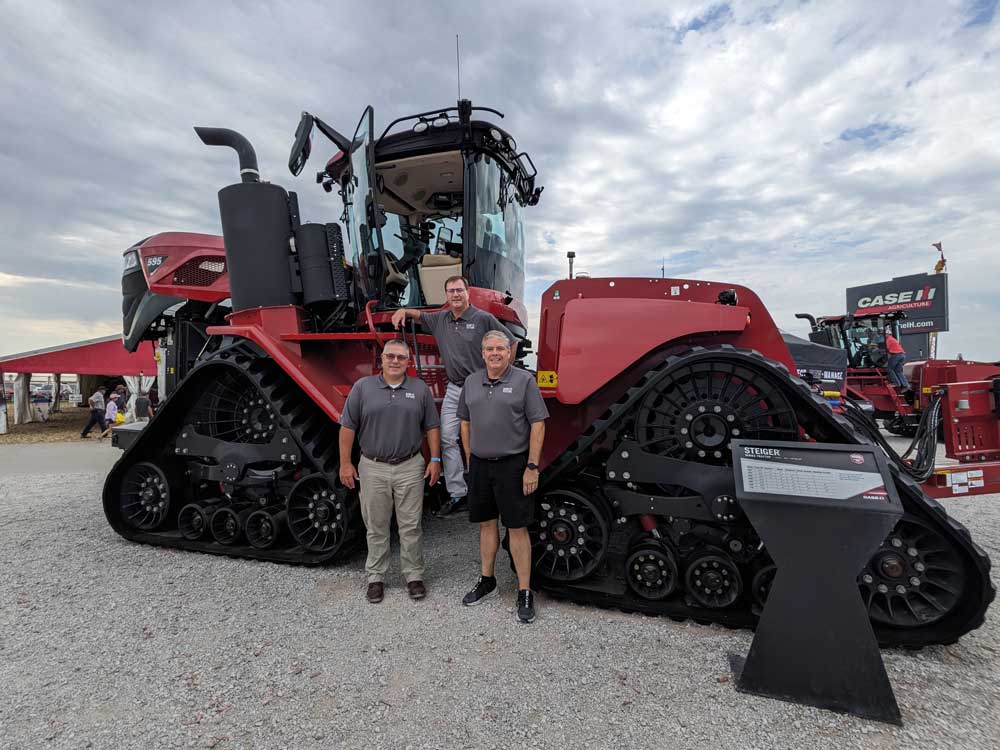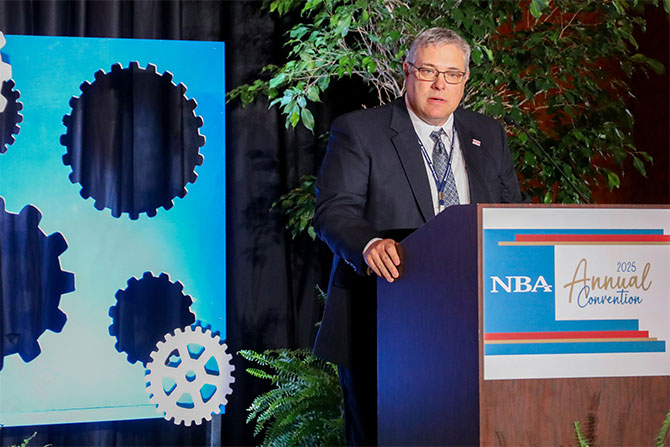Like many Nebraskans growing up in the 1980s, Mark Linville experienced the challenges in agriculture. Many people viewed bankers as the problem amid the farm crisis, even as banks were facing closures and mergers. Despite the economic turmoil, Linville saw the positive impact that a good banker had on the lives of local businesspeople, farmers and the economy as a whole.
“My family has experienced both sides of this. So, I truly see how important it is to have a banker who’s a partner who views you as more than just a number. It’s a personal relationship, and that’s especially true when times are challenging,” Linville said.
Linville’s early exposure to the impact of a community banker played a significant role in shaping his decision to enter the banking industry. Throughout his 35-year career, Linville has remained committed to helping his customers and community thrive. As the 2025-26 Nebraska Bankers Association chair, that dedication expands to the entire NBA membership.
Community Impact
Linville values community involvement, whether it’s through the bank donating to a cause or volunteering in the community. One of the biggest impacts First State Bank has had on the Randolph community was the Downtown Betterment Revolving Loan Fund in 2011. The bank established a revolving loan fund used by local businesses to install new sidewalks, update infrastructure in downtown buildings and more. A committee of three community members and a banker determines where and how those funds are used.
Additionally, the bank and others in the area contributed funds to convert part of the elementary school into a preschool and daycare in Randolph. As children age out of the preschool, they transition into the elementary school. The availability of childcare has attracted parents from other communities to Randolph. The school is growing as a direct result and does not need to consolidate. For a small school, that’s uncommon. Linville called the childcare availability a game-changer for both the school and the community.
“Bankers are the cornerstone of their respective communities through volunteerism and leadership. I like the community involvement. You know, when there’s a community project, the bank is the first call. And I’m glad it is — we want to be a part of that. Not only are we expected to participate, but we want to participate. It’s a good part of the responsibility of being a banker and living in a small town,” Linville said.
Linville understands the impact that his bank and other Nebraska banks have on the communities they serve.
“We work in an incredible industry, one that serves as the heartbeat of our state. If you have a bank that’s engaged and investing in their local community, the community looks like it. Show me a thriving bank, and I’ll show you a thriving community,” Linville said.
A Personal Touch
As a small-town banker, Linville leads a team that is much smaller than at a larger bank, and everyone wears multiple hats to make sure all bases are covered.
“My team does everything that the big banks do, on a smaller scale. And it’s very personal. Our customers know the people who make the decisions — we go to church with them, we go to school functions with them, and we stand in line at pancake feeds with them. We’re very nimble because the decisions are all made right here,” Linville said.
Linville and his team appreciate their customers’ in-person visits. He said that although local customers can complete most banking-related processes remotely, they prefer to come to the branch and visit with their banker. These connections provide the bank with direct accounts of the current economic climate and help the bankers address customers’ concerns of tight or, in some cases, negative profit margins.
Linville said some consumers are also facing limited discretionary income, as well as challenges related to funding mortgages. Between the increasing housing prices and higher interest rates, becoming a homeowner is more difficult. However, Linville’s role as a banker allows him to help people find solid financial footing.
“It’s exciting making a dream come true or giving people the opportunity to have the capital to follow a dream. I love getting young people started, whether it be in farming, starting a small business, purchasing a house or buying their first car — that is without a doubt one of my favorite things,” Linville said.
Advocacy
As the head of a community bank, Linville has seen the impact that federal legislation has on both banks and customers.
Federal banking regulators have implemented what Linville calls “useless, expensive and often foolish overregulation.” Such regulations affect banks of all sizes from both urban and rural areas across Nebraska. Federal regulations requiring increasingly stiffer procedures and rules can make it trickier to find a balance between focusing on the customer and making sure all of the boxes are checked for the regulators, no matter the size of the bank.
“I don’t need a regulation to know I need to take care of our community. If we weren’t doing community reinvestment, our bank wouldn’t exist. We wouldn’t survive if we weren’t adequately taking care of CRA. It’s obvious: either you are or you aren’t,” Linville said.
In March, Linville was among over 40 Nebraska bankers who traveled to Washington, D.C., to meet with Nebraska’s congressional delegation and discuss banking policy and the role banks play in supporting communities and driving our state’s economy. While there, he highlighted the unnecessary burden and cost of stricter banking regulations.
“Banking needs to be about serving our customers and generating profit for our shareholders, not about being a political ping pong ball for politicians. Within the banking industry, there are some things that banks may not have in common with one another, but there are more similarities than differences, and we’re not necessarily on opposite sides,” Linville said.
Engagement from across the industry is essential to shaping policy and pushing back against misguided regulation.
A recent example is the Access to Credit for our Rural Economy (ACRE) Act, a modified version of which was included in the budget reconciliation legislation recently signed by President Trump. The banking industry had long advocated for the bill.
“The ACRE Act is the most critical piece of legislation that I’ve seen in years. It’s huge for our community banks, our farmers and our ranchers because those savings will be passed along to them,” Linville said.
He also stressed the importance of bankers becoming personally involved in government relations efforts. The NBA has a longstanding commitment to advocating for Nebraska banks. Bankers can participate in such efforts through the NBA Legislative Advocate Program or the NBA Government Relations Committee, or by donating to the NBA BankPAC to help support pro-business, pro-banking candidates and legislation at both the state and federal levels.
“There’s a reason the NBA exists, and a lot of good things can happen from bankers having one voice. And the NBA can be that voice,” Linville said.
Linville encourages Nebraska bankers to use their voice as political power. He said the most important thing, perhaps more so than visiting Washington, D.C., is reaching out to your federal representative or senator on a personal level.
“They don’t remember a copy/paste from a talking point. But they remember a personal written letter or a personal phone call,” Linville said.
Leadership and Giving Back
Banking is all about relationships. Linville cherishes the connections he has made since first becoming involved with an NBA committee 20 years ago. He recalled feeling welcomed and valued by more experienced bankers, which helped him grow as a banker.
“I remember being a young banker at my first NBA committee meeting and thinking, ‘Man, there are a lot of seasoned, well-respected, bright bankers here.’ And they cared what I thought. I thoroughly enjoyed my experience. From that moment on, I knew I wanted to stay involved. I have so much respect for the bankers that I’ve worked with over the years,” Linville said.
Serving on numerous NBA committees during the past two decades has taught Linville new perspectives, shown him how others in the industry were tackling problems and helped him build relationships with peers in the banking world.
Mentorships have always been important to Linville. Through his early banking career, he looked for and found mentors within the industry. As young bankers enter the industry, he urges experienced bankers to become mentors and encourages young bankers to seek out mentors within their bank. Linville said it’s a mutual relationship — mentors need the mentees and vice versa — to be able to bounce ideas off of and learn from one another.
Looking Forward
As the banking industry evolves, Linville is optimistic about its future. He has seen a change from a banking career being viewed as “stuffy” to a renewed sense of excitement about career opportunities. He said there is room for a variety of skills, from HR to compliance, IT to computer science, lending to bookkeeping, tellers and more.
New technologies and opportunities in banking can also lead to new threats from fraudsters. One of Linville’s goals as NBA chair is to address the increasing prevalence and variety of scams and fraud. One way is by being able to quickly share information with members across the state when fraud and other issues arise.
He also wants the NBA to be responsive and have open lines of communication among its members. As part of this initiative, the NBA holds monthly “Membership Updates” via Zoom to keep members informed of state and federal legislation affecting banks, upcoming NBA events and any other banking-related issues that arise across Nebraska.
The NBA is a critical partner to banks of all sizes across the state. Linville fully understands that the NBA exists to serve its members, with bankers representing one another through volunteer leadership roles within the association.
“I care deeply about the NBA, that it’s vibrant, growing and serving our members well into the future. There’s a need for the NBA — that’s why I chose to volunteer my time to serve. It’s had such a positive impact on me and our bank. I can’t imagine not having it. So, it’s important that it grows and thrives and, most importantly, is member-driven. That’s what it’s all about,” Linville said.
More About Mark
Mark Linville graduated from the University of Nebraska at Kearney with a bachelor’s degree in comprehensive business with a finance emphasis. He has also completed the Graduate School of Banking at Colorado and was a member of the Nebraska LEAD Program Class 23.
Linville has taken an active role within the banking industry, serving on the NBA Board of Directors, Executive Committee, Government Relations Committee, BankPAC Committee, Education Advisory Committee and Voluntary Employee Benefits Association Board of Trustees. He has also been a member of the Community Bankers and Government Relations Councils with the American Bankers Association.
A native of Broken Bow, Nebraska, Linville began his career at Bank Central and Central Insurance Agency in Beloit, Kansas. In 1992, he joined First State Bank and First State Insurance Agency in Randolph, Nebraska. Ten years later, he was promoted to president and CEO, a role he still holds today. He is also the founder and owner of a wealth management firm, 1st Financial Services, where he is a Series 7 investment advisor.
His service extends to community and local leadership roles over the years. Linville has served as president of the Randolph Area Community Club, director of the Randolph Area Foundation and chairman of the Randolph Community Fair. Additionally, he has been a TeamMates mentor at Randolph Public School and a volunteer EMT with the Randolph Volunteer Fire and Rescue Department. Linville also volunteers with SYC of Northern Nebraska, an organization that helps youths with special needs, as well as Man 2 Man Prison Ministries and Merritt Youth Retreat for high-school-age young people. Outside of banking, Linville enjoys spending time with his family, camping, hunting and fishing.









